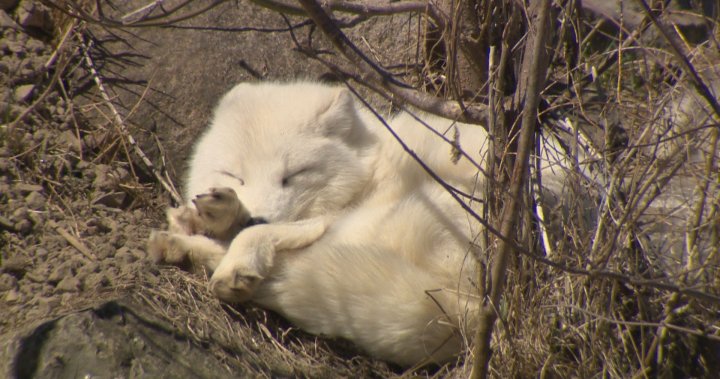Hundreds of families are flocking to the Ecomuseum in Sainte-Anne-de-Bellevue this weekend for an annual Easter tradition, celebrating spring and taking part in games and activities for children.
This weekend, organizers expected more people than usual because of the nice weather
“For the entire weekend we hope to have thousands of people,” spokesperson Sarah Prince-Robin tells Global News.
According to her, on Saturday alone they had two thousand visitors.
“We recommend for you to buy tickets online,” she advises. “But really, no worries. We are all organized to make sure that everything is smooth.”
The Ecomuseum’s aim for the weekend, however, was less about staff dressed in bunny suits and giving free chocolate, and more about issues concerning the wild creatures living at the zoo.
“If you don’t understand why you should worry about a groundhog, or a moose and how they relate to you, that’s when the understanding of environmental issues becomes more difficult,” executive director David Rodrigue explains, adding that education is at the heart of any activity they host.
The email you need for the day’s
top news stories from Canada and around the world.
The purpose, he says, is to get people close to the hundred native species of animals at the zoo, so visitors become more interested in learning about the environment and how the actions of some animals, including that of humans, affect other creatures.
“Why is it maybe important to manage the water that you use?” Rodrigue explains. “How does that relate to you? Why is it important that we keep ecosystems that look like we don’t use them, but why are they important to the air that you and I breathe?”
One issue they raise is climate change, and how this year’s early spring even affected some animals at the zoo, including the black bear who emerged from hibernation weeks early.
“She was out in February this year, which is extremely early,” Rodrigue notes. “Obviously if she’s coming out early, other bears in the wild are coming out early as well. This shortening of the winter season, we are starting to see that for some animals, it’s detrimental.”
He points out that there are winners and losers and that some species like the giant swallowtail butterfly has now moved north into Quebec. One loser, though, is the red fox.
“It’s been expanding north quite substantially in Quebec,” he says, “to the point where they are ranging where the arctic fox is. They are out competing the arctic foxes very severely on resources.”
Sinclair Harris who takes her Girls Guides groups to the Ecomuseum on regular visits, visited Saturday with her family and agrees that presenting these lessons in a fun way helps. She believes it doesn’t matter how the children get the information, as long as they learn.
“There has to be a little bit of a carrot,” she reasons. “The more exposure, the more sensitization to these things.”
Easter weekend at the Ecomuseum wraps up Monday.
© 2024 Global News, a division of Corus Entertainment Inc.




